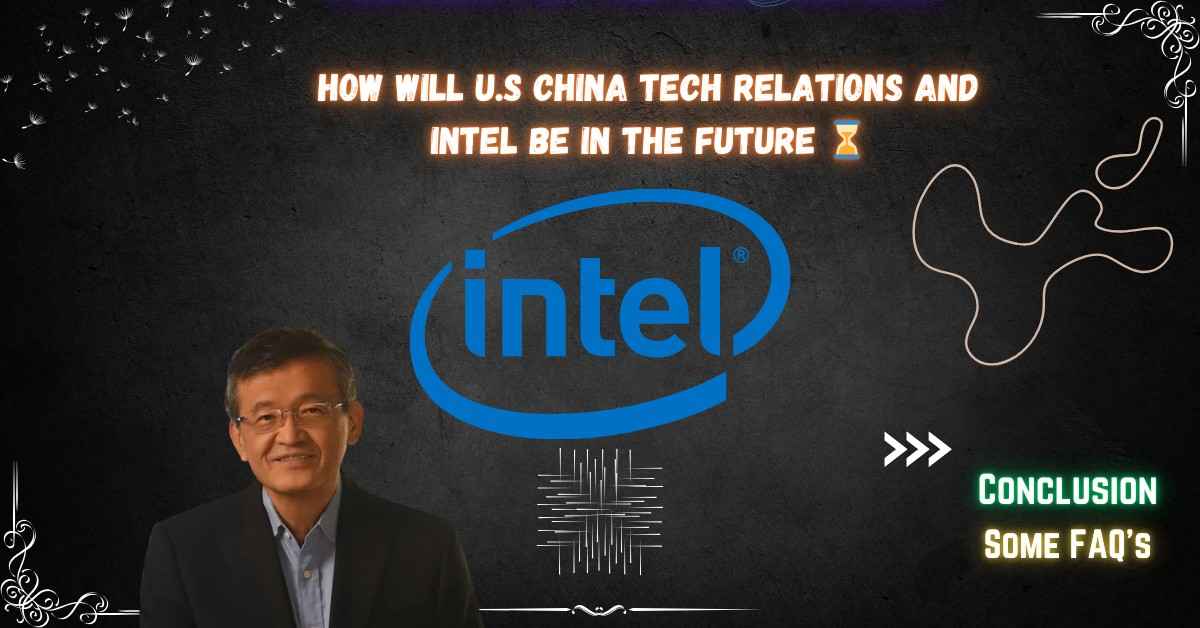The tech community is still in a dilemma following the surprising promises of the former U.S President Donald Trump regarding the sacking of the Intel corporation chief executive officer because of his suspected ties to China in terms of business relationships. The Intel CEO China Ties debate has quickly become a hot topic in politics, technology, and global trade discussions. Advocates believe the associations to be a threat to the national security of the United States and their opponents believe this actions to be political stunts seeking publicity.
This paper will go into details to explain what led to Trump outrageous call, the history of Intel operations in China, and how this is likely to affect the tech industry.
The Resignation Call of Fires 🚨
Trump’s statement came during a rally in Texas, where he accused Intel’s leadership of being “highly conflicted” due to their Intel CEO China Ties. He alleged that such relationships threaten the competitiveness between the U.S. and the rest of the entire world in semiconductor production and also the risk of providing an upper hand to a competitor superpower.
He also claimed technology firms with high contact with China are leaking important innovations at risk to economy and military security. The assumption that he might be answered by some compromises was not possible as he demanded the resignation of the CEO in directly insistent way.

The Place of Intel in the Tech Industry in the World 🌎
Intel is a worldwide renowned semiconductor manufacturer with its products spanning laptops and servers to AI chips and 5G infrastructure. Given its influence, Intel CEO China Ties are not just a corporate issue but a matter of geopolitical interest.
China stands as one of the largest markets that Intel has, and it also maintains various partnerships, research centers and supply chain dependence in this market. In as much as this is not unique to international business, critics believe that the fact that the CEO of the company is deeply involved with China creates doubts of loyalty and strategic choice.
The controversy Origins 🌐
The Intel CEO China Ties controversy began after reports suggested that Intel’s top leadership maintained close personal and professional relationships with major Chinese tech executives.
Allegations include:
- Business transacts with Chinese-state companies.
- Collaboration in common research programs in areas of sensitive technology.
- High level meetings with Chinese government regularly.
Even though Intel has denied any misdeeds, the time of such disclosures amid swelling tensions between the U.S. and China has made the matter extremely incendiary.
Explore more: GPUHammer Attack Weakens NVIDIA AI Models: A Deep Dive into the Threat
National Security Issues
To the critics, such as Trump, it is not only business, but security as well. The modern current defense system, AI-related tools, and the communications grid depend on semiconductors.
The fear is that Intel CEO China Ties could indirectly help China gain access to cutting-edge technology, weakening America’s competitive edge. U.S. intelligence agencies have repeatedly warned about the risks of technology transfers, even unintentional ones, through corporate collaborations.
Intel reply
Intel strongly denied the charges in an official statement saying:
Realizing this, Intel is operating its business worldwide with full compliance with the laws and regulations of the United States. In China, our operations are open and legal and are necessary to our global clientele.”
The CEO personally addressed the Intel CEO China Ties claims, saying that partnerships in China are purely commercial and that Intel has always prioritized U.S. national security interests.
Political and economical ripple effect 📊
The scenario is already affecting politics and business as well as the stock market. Intel, shares dropped slightly following the remark by Trump when investors got confused.
Political observers are indicating that this might turn out to be a wider debate on whether the American companies need to reduce their operations in China. If pressure grows, the Intel CEO China Ties issue could spark policy changes in Washington.

How will U.S China Tech Relations and Intel be in the Future ⌛
The resignation of the Intel CEO or not, one can expect this event to determine the future strategy of this company. Certain analysts are thinking that Intel can transfer further operations back to the U.S. in order to evade more criticism.
For the U.S. tech industry, the Intel CEO China Ties controversy is a reminder that in today’s world, corporate decisions have far-reaching political consequences. Never has the attempt to balance profit and patriotism been as difficult.
Conclusion 💡
The Intel CEO China Ties debate is more than a political spat—it’s a reflection of the ongoing struggle between economic opportunity and national security. Intel is now in the limelight owing to the aggressive request being made by Trump that has compelled the tech giant to allow defense of its business strategy in the global context.
As the tensions between the United States and China persist, the world will wait to find out whether Intel will re-strategize its course of actions- or it will reinvest in the current relationships.
Explore more: BlueNoroff Deepfake Scam: macOS Backdoor Malware Hits Crypto Staff
FAQs
1. What are the Intel CEO China Ties?
- ANS: The term denotes supposed business, research, and personal ties of the CEO of Intel company with Chinese firms or organizations having connections with the government.
2.What was the misdemeanor of Trump that made him ask the Intel CEO to step aside?
- ANS: According to Trump, these relationships might threaten U.S. integrity and competitiveness to have the semiconductor.
3.Does it violate the law to do business in China by Intel?
- ANS: No. According to Intel, its activities run within the U.S law and are commercial in nature only.
4.How important is the China business to Intel Corp?
- ANS: China is also a major market to Intel and offers the company extensive scale of revenues and supply chains as well.
5. Is Intel, as a share, susceptible to the scandal?
- ANS: Yes. Investor confidence might be affected by political pressure and the opinion that people would have.
6. Mun will the CEO resign?
- ANS: No official sign of resignation is present so far, however political pressure may affect other corporate decisions.
7. So what does this portend with respect to U.S.-China tech relations?
- ANS: It contributes to the rising mistrust and can predetermine the increase in the restrictions that the American companies will have to cope with when conducting business in China.



